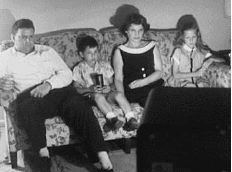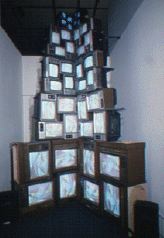| 1) "...I think it's a mistake to lose one's sense of
death, even one's fear of death. Isn't death the boundary we need? Doesn't
it give a precious texture to life, a sense of definition? You have to
ask yourself whether anything you do in this life would have beauty and
meaning without the knowledge you carry of a final line, a border or limit"
(228-9).
|

. |

. |
2) "He would be Death, or Death's errand-runner, a hollow-eyed technician from the plague era, from the era of inquisitions, endless wars, of bedlams and leprosariums. He would be an aphorist of last things, giving me the barest glance--civilized, ironic--as he spoke his deft and stylish line about my journey out...How does it feel to see Death in the flesh, come to gather you in? I was scared to the marrow. I was cold and hot, dry and wet, myself and someone else" (243). |
| 3) "Picture yourself, Jack, a confirmed homebody, a sedentary
fellow who finds himself walking in a deep wood. You spot something out
of the corner of your eye. Before you know anything else, you know that
this thing is very large and that it has no place in your ordinary frame
of reference. A flaw in the world picture. Either it shouldn't be here
or you shouldn't. Now the thing comes into full view. It is a grizzly bear,
enormous, shiny brown, swaggering, dripping slime from its bared fangs.
Jack, you have never seen a large animal in the wild. The sight of this
grizzer is so electrifyingly strange that it gives you a renewed sense
of yourself, a fresh awareness of the self--the self in terms of a unique
and horrific situation. You see yourself in a new and intense way. You
rediscover yourself. You are lit up for your own imminent dismemberment.
The beast on hind legs has enabled you to see who you are as if for the
first time, outside familiar surroundings, alone, distinct, whole. The
name we give to this complicated process is fear." "Fear is self-awareness
raised to a higher level...If death can be seen as less strange and unreferenced,
your sense of self in relation to death will diminish, and so will your
fear" (229).
. |
 |

. |
4) "How can pretending to be injured or dead save a person's life?" "If she does it now, she might not have to do it later. The more you practice something, the less likely it is to actually happen" (207). |
| 5) "Tibetans believe there is a transitional state between
death and rebirth. Death is a waiting period...That's what I think of whenever
I come in here. [The supermarket] recharges us spiritually, it prepares
us, it's a gateway or pathway. Look how bright. It's full of psychic data...Everything
is concealed in symbolism, hidden by veils of mystery and layers of cultural
material. But it is psychic data, absolutely. The large doors slide open,
they close unbidden. Energy waves, incident radiation. All the letters
and numbers are here, all the colors of the spectrum, all the voices and
sounds, all the code words and ceremonial phrases. It is just a question
of deciphering, rearranging, peeling off the layers of unspeakability"
(37-8).
. |

. |
 |
6) "We have these deep terrible lingering fears about
ourselves and the people we love. Yet we walk around, talk to people, eat
and drink. We manage to function. The feelings are deep and real. Shouldn't
they paralyze us? How is it we can survive them, at least for a while?
We drive a car, we teach a class. How is it no one sees how deeply afraid
we were, last night, this morning? Is it something we all hide from each
other, by mutual consent? Or do we share the same secret without knowing
it? Wear the same disguise?" "What if death is nothing but sound?" "Electrical
noise." "You hear it forever. Sound all around. How awful." "Uniform, white."
. |
| 7) "No one knew what was wrong. Investigators said it could be the ventilating system, the paint or varnish, the foam insulation, the electrical insulation, the cafeteria food, the rays emitted by microcomputers, the asbestos fireproofing, the adhesive on shipping containers, the fumes from the chlorinated pool, or perhaps something deeper, finer-grained, more closely woven into the basic state of things" (35). |

. |

. |
8) "Baba, I am the one in this family who is obsessed by death. I have always been the one...You are the happy one. I am the doomed fool. That's what I can't forgive you for. Telling me you're not the woman I believed you were. I'm hurt, I'm devastated...I've been afraid for more than half my life." "What do you want me to say? Your fear is older and wiser than mine?" (197-8) |